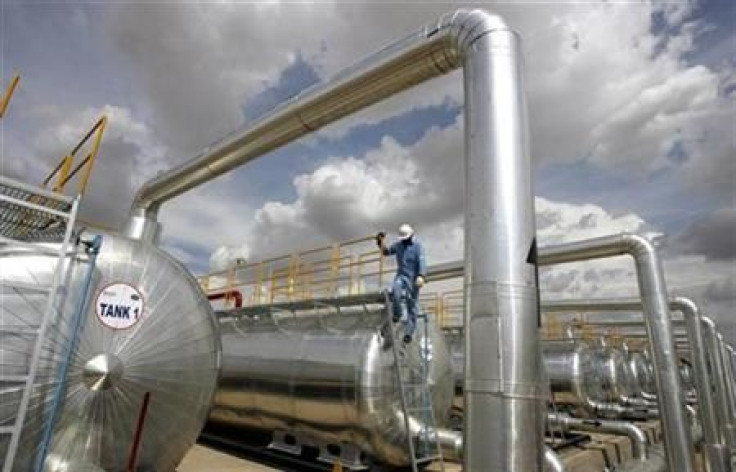Indian Police Suspect Top Energy Companies Of Corporate Espionage, 12 Arrested

NEW DELHI -- In an incident that threatens to blow up into a major case of corporate espionage, government officials, company executives and people associated with top energy companies in the country have been detained over the past two days after local police caught them stealing government documents from the oil ministry.
Five people, including two junior government officials, a former journalist and at least one junior executive of an energy company, were arrested Thursday on charges of stealing sensitive official documents. Two more people were arrested Thursday night, the chief of Delhi's police said, while several others were also being questioned.
The latest allegations renew concerns of a nexus between government officials, large corporations and the media in India. In November 2010, recorded telephone conversations between a lobbyist and influential businessmen, politicians and journalists became public, and generated much public debate in the country. Although U.S.-style lobbying is not permitted in India, unofficially, lobbyists have been operating for decades now. But, the nature of lobbying has evolved since India began liberalizing its economy in 1991. The unshackling of the economy in the last two decades and a half, however, has brought in its wake allegations of crony capitalism.
"One of the greatest dangers to the growth of developing countries is the middle income trap, where crony capitalism creates oligarchies that slow down growth. If the debate during the elections is any pointer, this is a very real concern of the public in India today," Reserve Bank of India chief Raghuram Rajan said last year.
During his election campaign last year, and since he came to office in May 2014, Indian Prime Minister Narendra Modi has, on several occasions, vowed to end corruption in India. "Corruption has become such a dangerous disease in the country. It is worse than even cancer and can destroy the country. The country is not willing to tolerate evils (like corruption) for long," Modi had said in August last year.
According to a Press Trust of India (PTI) report, the arrested company executive was an employee of Reliance Industries Ltd (RIL), a conglomerate with diverse interests, including in the textiles, media and energy sectors. RIL operates the largest oil refinery in the world, in western India, and is among the top five companies in the country in terms of market capitalization, and is headed by Mukesh Ambani, the richest Indian on the Forbes list.
The Delhi police have reportedly said that among other important documents, papers related to a crucial arbitration between RIL and the government related to its gas fields off India’s east coast were leaked. Other documents possibly relate to the upcoming federal budget, which is due by the end of February, and the pricing of natural gas and internal government papers that might have significant commercial value.
NDTV, a local television network, citing police sources, said that an official from the Reliance Anil Dhirubhai Ambani (ADA) Group -- which is controlled by Anil Ambani, Mukesh Ambani’s estranged younger brother -- was questioned at his office in Delhi. The Ambani brothers split their family-controlled Reliance Group in 2006, four years after their father and the group’s founder, Dhirubhai Ambani, died. An executive from the Essar Group, which has interests in steel, and oil and gas, was also questioned, the network reported. IBTimes could not independently confirm the NDTV report.
Late Friday night, Delhi police arrested five more corporate executives, taking the total number of people arrested so far to 12. Those arrested include senior officials from RIL, Reliance ADA Group, the Essar Group, and oil and gas company Cairn India, the Times of India reported.
According to B.S. Bassi, Delhi's police chief, the people arrested “trespassed” and then “photocopied” and “stole” government documents. They've also been charged with forgery because they had access to a set of keys, fake IDs and access cards, and the police will consult with the energy ministry before pressing further charges.
“No, we cannot comment till we know the details,” an RIL spokesperson said in a text message in response to a query by International Business Times.
While the government officials arrested belong to India’s petroleum and natural gas ministry, at least one of the others arrested is a former journalist Santanu Saikia, who runs Indianpetro.com, an energy consultancy. Another energy consultant, Prayas Jain, has also been arrested.
Petroleum and natural gas constitute about 29 percent of the total energy consumption in the country. RIL, which operates the world's largest oil refinery in Jamnagar, in the western Indian state of Gujarat, is also a significant player in the gas exploration sector in the country.
In the recent past, the company has found itself at the center of a major controversy concerning the pricing of natural gas that is pumped out from offshore and onshore fields in India. The oil and gas industry is of strategic importance to India as the country imports a bulk of its energy needs, and it is the fourth-largest energy consumer in the world after China, the U.S. and Russia.
On Friday, the Free Press Journal reported that official documents from the coal and power ministries too had been leaked. However, this could not be independently confirmed.
© Copyright IBTimes 2024. All rights reserved.











